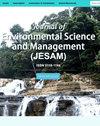Social Capital and Vulnerability to Extreme Climate in a Semi-urban Fishing Community in Laguna de Bay, Philippines
IF 0.3
4区 环境科学与生态学
Q4 ENVIRONMENTAL SCIENCES
引用次数: 4
Abstract
The study looked into the risks associated with extreme climate events in the case of a semi-urban fishing community surrounding Laguna Lake in the Philippines. A survey was undertaken to determine the economic effects (loss of assets, foregone income, and changes in consumption patterns) of strong typhoons and torrential rains on fishing households. Vulnerability, estimated as the perceived probability of lower consumption after flooding or typhoons, was used to assess the economic impact on households. Household characteristics, including social capital, that may influence consumption vulnerability, were analyzed using a binary probit regression model. Social capital, a multi-dimensional concept consisting of social networks and skills possessed and used by household members to facilitate actions, was modeled using four indicators – two associational (membership in a formal organization and usefulness of informal social networks) and two behavioral (trust and cooperativeness). Regression results revealed that fishing income and household size significantly affect vulnerability. The higher the fish catch and the smaller the household, the less vulnerable is the household to strong storms and torrential rains. Social capital indicators do not significantly affect consumption vulnerability of households.菲律宾拉古纳德湾半城市渔业社区的社会资本和对极端气候的脆弱性
该研究以菲律宾拉古纳湖周围的半城市渔业社区为例,调查了与极端气候事件相关的风险。进行了一项调查,以确定强台风和暴雨对渔民家庭的经济影响(资产损失、收入损失和消费模式的变化)。脆弱性,估计为洪水或台风后消费下降的感知概率,被用来评估对家庭的经济影响。使用二元概率回归模型分析可能影响消费脆弱性的家庭特征,包括社会资本。社会资本是一个多维概念,由家庭成员拥有和使用的社会网络和技能组成,以促进行动。社会资本使用四个指标进行建模-两个关联指标(正式组织的成员资格和非正式社会网络的有用性)和两个行为指标(信任和合作)。回归结果显示,渔业收入和家庭规模对脆弱性有显著影响。捕鱼量越高,家庭规模越小,家庭就越不容易受到强风暴和暴雨的影响。社会资本指标对家庭消费脆弱性影响不显著。
本文章由计算机程序翻译,如有差异,请以英文原文为准。
求助全文
约1分钟内获得全文
求助全文
来源期刊

Journal of Environmental Science and Management
ENVIRONMENTAL SCIENCES-
CiteScore
0.90
自引率
0.00%
发文量
10
审稿时长
2 months
期刊介绍:
The Journal of Environmental Science and Management (JESAM) is an international scientific journal produced semi-annually by the University of the Philippines Los Baños (UPLB).
JESAM gives particular premium to manuscript submissions that employ integrated methods resulting to analyses that provide new insights in environmental science, particularly in the areas of:
environmental planning and management;
protected areas development, planning, and management;
community-based resources management;
environmental chemistry and toxicology;
environmental restoration;
social theory and environment; and
environmental security and management.
 求助内容:
求助内容: 应助结果提醒方式:
应助结果提醒方式:


